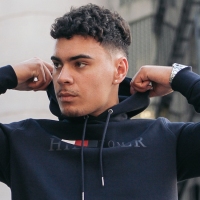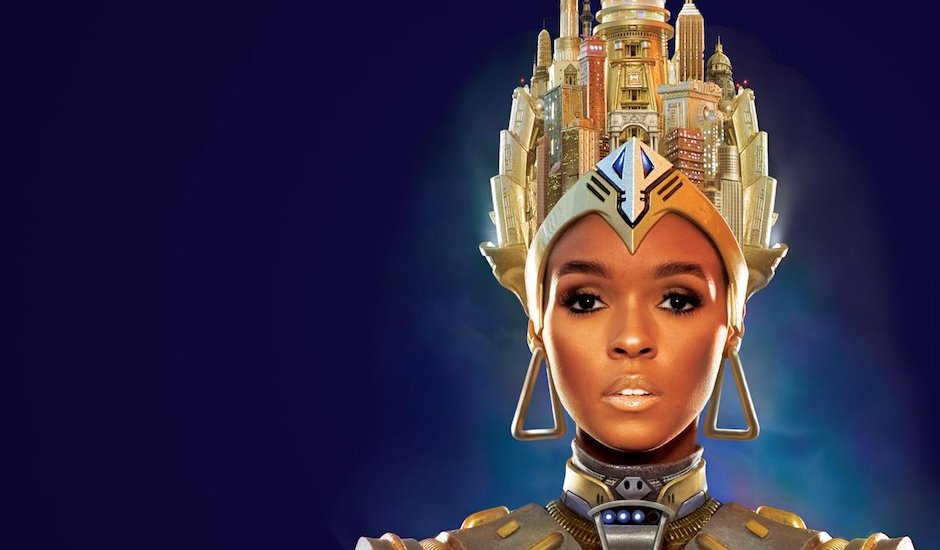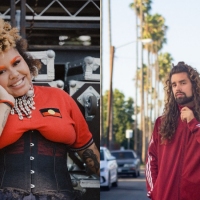 Meet rising Brisbane rapper Day1, and his fierce new single RidingIn his second single for the year thus far, the fresh face to Australian hip-hop proves that he's one to watch.
Meet rising Brisbane rapper Day1, and his fierce new single RidingIn his second single for the year thus far, the fresh face to Australian hip-hop proves that he's one to watch.

10 years of Janelle Monáe's The ArchAndroid, and its complex creator
It’s been ten years since Janelle Monáe burst forth with The ArchAndroid, but why has her blockbuster decade left her on the periphery of the pop conversation?
What’s the difference between recognition and reverence?
It’s a thin line that cuts like a chasm, splitting the first-rate and the famed. The latter might end up on your feed at any time, the comments filled with adoration, speculation, reservation and at least a handful of denigrating quips, whilst the former experience a quieter kind of acclaim. Bey and Ari might set the net ablaze, but most couldn’t manage, even if they tried.
May 18th marks a decade since Janelle Monáe stepped into the spotlight with The ArchAndroid, her 18-track suite of a debut, and even having spent those years solidifying herself as one of the most versatile talents of her time, I can’t help but feel she’s still on the wrong side of that division.
I’m not here to argue that Janelle Monáe isn’t famous: we all know who I’m talking about, and that’s proof enough. She’s that musical chameleon that turned out one of the decade’s most impressive catalogues, dropping three accolade-ridden LPs and cropping up on fun.’s ubiquitous 2011 hit, We Are Young. In 2016, she saw Hidden Figures lose the Best Picture statuette to Moonlight, winning even as she took a loss. Still, it’s not all wins: the come up has been well earned and the acclaim undeniable, but even as Monáe moves amongst the most creatively potent artists of the now, she’s still more recognised than revered.

Janelle Monáe moved to Atlanta in 2003, a fresh-faced 18-year-old hawking her demo from the back of a Mitsubishi Galant. She acquainted herself with local acts, linking with Chuck Lightning and Nate Wonder of Deep Cotton to form Wondaland Arts Collective. It was here the gears started turning – Lightning first broached the idea of androids – and whilst things seemed to be creatively catalysing, Monáe soon lost her job for replying to fanmail on the Office Depot computers. She put it to a melody, and soon enough, it made its way to one of the city’s heaviest hitters: Outkast’s Big Boi.
It’s an origin story that befits the sweeping vision of that ambitious debut, one that nests familiar truths in a retro-futuristic varnish. The influence of director Fritz Lang hangs high over The ArchAndroid, with the cover art channelling the iconic portrait of the Maschinenmensch from 1927’s Metropolis. Monáe uses that name for her own dystopian locale, even pulling the year of her story – 2719 – from the film’s release date. More important than direct reference, however, is the spirit of Afrofuturism that courses throughout the project. If Lang’s bitterly divided society is a touchstone, then Sun Ra’s cosmic vision of liberated Afrocentricity is a more intangible force, the bold vision of Space Is The Place lending to her visions of disenfranchisement, alienation and ‘other’-ness.
The protagonist of the cosmic odyssey, Cindi Mayweather, is presented as a clone of Monáe herself, pulled from her genome in some out-of-time kidnapping. To be an android is to be shunned, relegated to the fringes of a vicious society that fears its own creations. Cindi isn’t without the faculties we’d consider human – she thinks, she feels, and through Monáe, she sings – but she’s nonetheless a different class of citizen. It’s a wrong only she has the power to right, and the ArchAndroid falls like Neo from the Matrix, capable of waking the world to the insidious powers that be.
Indeed, as the narrative paints Cindi as the Messianic saviour of the androids, it attests to her inner strength, her self-recognition and her passionate struggle against oppression. It’s a story that, as the liner notes quip, “does not bear logical sense,” but Janelle doesn’t let logic get between her and a good story – or a good story get between her and a good song.

The cinematic opening, Suite II Overture, channels the perils faced in her Metropolis: Suite I (The Chase) EP, where Cindi fell in love with a human, escaped Droid Control and was left living as a fugitive. The chase is over, but the propulsive Dance or Die keeps the momentum going, throwing us into a street corner war between those who have – humanity – and those who entertain them – the androids. It’s the first in an incredible three track run, the segues from Dance or Die to Faster and Locked Inside making for a double-time R&B suite itself.
The duelling threads of romance – Sir Greendown is the object of her supposedly ‘unnatural’ affections – and revolution – the Cold War in which she’s caught – are interlinked in their resistance, with personal love the spark that sets the insurrection alight. It’s in the moments of peace that the fire of revolt burns brightest, such as on Oh, Maker, a “pastoral English folk” song that somehow seamlessly melds into a record steeped in a distant future. A prayer of sorts, it’s a Turing Test for the audience: when she recalls her distant lover, beyond the reach of her hand, does Cindi think? In one of her most powerful performances, Monáe leaves no doubt.
Cold War puts “the personal is political” to an uptempo new-wave beat, Tightrope finds the fun in righteous resistance, and tracks such as Mushrooms & Roses and Wondaland justify that fight with a glimpse at the eventual spoils: unbridled love, freedom and belonging. Neon Valley Street indulges melancholy with an uncommon levity, one pulled from her own certainty, whilst BaBopByeYa, the record’s nine-minute climax, sees that melancholy mold to resolve, driven by the knowledge that the answer is not in those circuit board memories, but in change yet to come.
The final inter-title of Lang’s Metropolis – “the mediator between the hand and the mind is always the heart" – sounded out the message for a then-fatigued audience. It’s a short statement that’s only sharpened with time, and Monáe recalls being particularly inspired by it. There’s something sobering about just how relevant that phrase is – and, perhaps, just how relevant it will always be – but The ArchAndroid believes in the values it extols, as much a call to arms as an individualistic creed. There’s a change to be made, and the first step is consciousness of the self: know what you love, know what you lack, and take that action. It’s a call to all the ‘androids’ of the world, those othered by a society that discriminates based on creed, sex, orientation and identity.
The ArchAndroid is a bold, impassioned telling that moves on a fluid foundation that incorporates elements of R&B, psychedelia, funk, synthpop, rock, pop, jump blues, orchestral arrangements and neofolk. It’s cinematic, it’s engrossing, it’s ambitious and it’s unlike anything else – the perfect distillation of Monáe herself. It’s no surprise she was drawn to film, nor is it all that shocking that she found a friend in Prince. What’s shocking is, even after all this, Janelle Monáe couldn’t really break the internet. Hell, she can hardly even chart.
If ever there was a track that could launch Janelle to the kind of radio-ready ubiquity she deserves, it was Make Me Feel, her posthumously Prince-assisted synth single. A shiny, modern dance track with the same swing that saw The Purple One reign, it managed a measly #99 on the Billboard Hot 100 – and even then, it marked just her second appearance on the chart. It beggars belief, really. Now I know how Skinner felt and, in a telltale sign of maturation, I too see that it’s the children who are wrong.
We all know who Janelle Monáe is, but somehow, it feels as though we don’t. She’s not a singer-turned-actor, or an actor who sings: she’s a truly trailblazing artist with both a striking vision and the ability to articulate it. The concepts and the compositions are so fiercely interlinked, they play as a show, complete with acts, curtain-raisers, cinematic embellishments and heart wrenching conclusions. She gave Bad Boy Records their finest record since Biggie’s Life After Death; gave Big Boi his most essential protege; and gave the world a debut so dense, beautiful and ambitious, it all but enshrined her as the oft-invoked ‘future of pop.’
If that claim never came to pass, we’ve at least some consolation – The ArchAndroid will sound like the future for a long while yet.
Follow Janelle Monáe: FACEBOOK
 Meet rising Brisbane rapper Day1, and his fierce new single RidingIn his second single for the year thus far, the fresh face to Australian hip-hop proves that he's one to watch.
Meet rising Brisbane rapper Day1, and his fierce new single RidingIn his second single for the year thus far, the fresh face to Australian hip-hop proves that he's one to watch.
 MXXWLL and Kaiit interview each other, celebrate new album SHEEESHThe two musicians - both specialising in their own, elite tiers of hip-hop and R&B's many sounds - find themselves come together.
MXXWLL and Kaiit interview each other, celebrate new album SHEEESHThe two musicians - both specialising in their own, elite tiers of hip-hop and R&B's many sounds - find themselves come together.